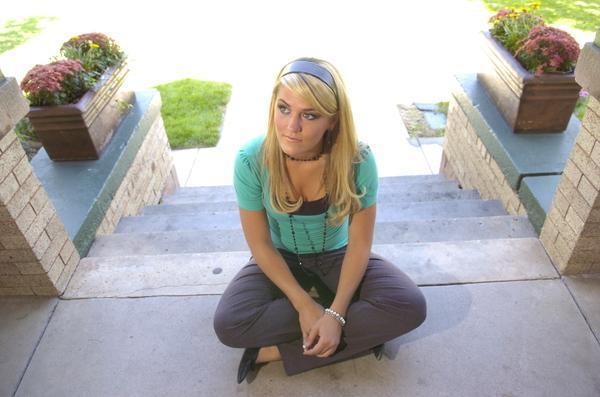GREELEY — As she was raped, Kimberly Corban plotted her revenge.
She memorized her attacker’s whispered taunts and gauged how tall he was, his weight, even his shoe size through quick peeks under the black shirt he had shoved over her face.
After an hour, he got off of her and started a conversation, trying to assuage his guilt. Corban, now 21, used that time as well to get to know her attacker.
“He would keep his voice in a whisper, talking to me, and he wouldn’t shut up,” said Corban, a University of Northern Colorado senior, recalling the May 12, 2006, attack. “He said he felt bad about this. He said it would ruin his day.”
But that didn’t stop him from threatening to return if she told anyone about the attack.
Even though he had covered her head virtually the entire time he was in her room, she was able to sketch a portrait of her tormentor in her mind that she later passed on to police.
Corban also tried to preserve physical evidence. She refused to put her pants on after he left, hoping police could identify him by the semen on her leg.
“I wasn’t going to survive by kicking and screaming, but by finding out who he was,” Corban said. “That’s how I would get my revenge.”
She got a measure of retribution in June when a Weld County jury found 25-year-old Ronnie Pieros guilty of sexual assault. This month, Pieros was sentenced to 24 years to life in prison for his attack on Corban.
“This happened to me for a reason, and maybe it was to help give women strength to speak up,” Corban said. “I don’t care if you are a stripper or you’ve been drinking – rape is rape, and it’s not your fault. You didn’t ask for this.”
She has had to fight through debilitating depression and seizures brought on by the trauma of the attack.
Still, Corban is happy with her decision to put her name out to the media, which typically don’t identify rape victims.
“I could have crawled inside myself and stayed home with my parents and watched TV every night and tried to forget about it all,” Corban said. “Believe me, I want to forget about it, … but I also want to do something about it.”
Corban was a business major at UNC before the attack. She has since switched to psychology and is pursuing a minor in speech to prepare herself for talking to groups about rape.
Both her mom and Weld County’s lead prosecutor say Corban’s willingness to talk about her experience will encourage other victims who refuse to report sexual assault.
“I just know how adamant Kim is to helping others to heal,” said Debra Corban. “I’m just hoping someone can pull from Kim’s strength to get them through something like this.”
“She’s a role model for all the victims out there,” said Weld County District Attorney Ken Buck.
Many rape cases, even ones as clear-cut as Corban’s, are complicated to prosecute, Buck said, often because of the intricate science involved in gathering evidence.
Corban’s push to get all rape victims to come forward can only help the effort to bring assailants to light. “She stood up for herself, and justice was done,” Buck said.
Before May 12, 2006, Corban was a typical college girl. She enjoyed sports and had a boyfriend and a wide circle of friends, including her sorority sisters.
She and two of her friends had just started renting an apartment in west Greeley, and they spent much of the week settling in after a frantic week of finals at UNC.
About 5 a.m. May 12, however, Corban’s secure world became a faint illusion. She woke from a deep sleep when a black shirt was pushed over her head, suffocating her.
A voice told her to shut up, and her attacker shoved her down on some pillows. “I had no eyesight; I had no idea where I was,” Corban said. “And all the time, he was whispering to me in that low voice.”
She decided to become submissive, worried that he had a weapon and he’d kill her. One of her roommates was gone, and the other was sleeping on another side of the apartment. Corban feared he would go after her too.
But Corban was also thinking. She told her assailant that she had herpes. When he wouldn’t stop, she told him she couldn’t breathe, so he lifted the shirt to allow her to gulp air.
Corban used those split seconds to catch glimpses of him. “I was able to give a description from head to toe,” she said.
After an hour, he lay down beside her. Corban remembered an article about a rape survivor who had engaged her attacker in small talk to avoid being killed.
Corban tried the same tack, hoping to gather information. For an hour, they talked about what he had done. “I told him not to worry about it,” she said. “Everyone makes mistakes.”
He also asked if he could get a drink of water. Corban deliberately sent him to the wrong cabinet in the kitchen, hoping he would leave fingerprints.
Later, after he finally left, Corban walked along the sides of the apartment’s carpeted corridor to try to avoid disturbing his footprints.
Later that day, she collapsed physically and emotionally, fearing the man would make good on his threats to come back and get her.
She also couldn’t shake a feeling of utter helplessness.
A hammer and a razor blade – tools she had used when moving into the apartment – were on her nightstand during the attack. But she couldn’t reach them during those two hours. “I just felt so useless,” she said.
After the attack, she moved in with her parents, who also lived in Greeley. But she couldn’t sleep alone, so she nestled between them at night. Her grades plummeted the next fall as she struggled to get up each morning.
She was diagnosed with post-traumatic stress disorder. A few weeks after the attack, the nightmare came thundering back into her head when police asked her to listen to a taped conversation with a man they had arrested for taking pictures of women’s buttocks at a Greeley apartment complex.
“When I heard that voice, I knew exactly who it was,” Corban said. “The officers said my face went completely white.”
She later learned that Pieros had stalked her and her roommate for a week. He had entered through an open window. Pieros also had a video camera with him when he attacked her.
Before Pieros’ trial, Corban started having seizures, sometimes several a week.
But her three-hour testimony remained rock-solid, and the evidence she provided police helped jurors convict Pieros after less than two hours of deliberation.
Corban said if she hadn’t reported her rape, she wouldn’t have had access to the therapy she received.
Also, she credits police, prosecutors, and her family and sorority sisters for helping her the past 16 months and for providing support for her future.
“In a way, I’ve been provided an amazing opportunity to help others,” Corban said. “And I’m going to take advantage of that.”





